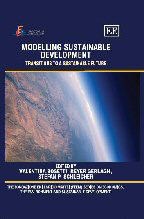Modelling Sustainable Development. Transitions to a Sustainable Future

01.09.2009
Valentina Bosetti, Reyer Gerlagh, Stefan P. Schleicher
Edward Elgar, Series on Economics, the Environment and Sustainable Development
This insightful book explores the issue of sustainable development in
its more operative and applied sense. Although a great deal of research
has addressed potential interpretations and definitions of sustainable
development, much of this work is too abstract to offer policy-makers
and researchers the feasible and effective guidelines they require. This
book redresses the balance. The authors highlight how various
indicators and aggregate measures can be included in models that are
used for decision-making support and sustainability assessment. They
also demonstrate the importance of identifying practical means to assess
whether policy proposals, specific decisions or targeted scenarios are
sustainable. With discussions of basic concepts relevant to
understanding applied sustainability analysis, such as definitions of
costs and revenue recycling, this book provides policy-makers,
researchers and graduate students with feasible and effective principles
for measuring sustainable development.
Contributors: T. Barker, C. Böhringer, V. Bosetti, B.K.
Buchner, C. Carraro, S. De-Ramon, M. Galeotti, R. Gerlagh, F. Ghersi,
J-C. Hourcade, W. Hyll, G. Klaassen, R. Kopp, A. Löschel, G. Martinus,
H. Pollitt, T.F. Rutherford, S.P. Schleicher, K. Smekens, G. Thenius,
R.S.J. Tol, B. van der Zwaan
This insightful book explores the issue of sustainable development in its more operative and applied sense. Although a great deal of research has addressed potential interpretations and definitions of sustainable development, much of this work is too abstract to offer policy-makers and researchers the feasible and effective guidelines they require. This book redresses the balance. The authors highlight how various indicators and aggregate measures can be included in models that are used for decision-making support and sustainability assessment. They also demonstrate the importance of identifying practical means to assess whether policy proposals, specific decisions or targeted scenarios are sustainable. With discussions of basic concepts relevant to understanding applied sustainability analysis, such as definitions of costs and revenue recycling, this book provides policy-makers, researchers and graduate students with feasible and effective principles for measuring sustainable development.
Contributors: T. Barker, C. Böhringer, V. Bosetti, B.K. Buchner, C. Carraro, S. De-Ramon, M. Galeotti, R. Gerlagh, F. Ghersi, J-C. Hourcade, W. Hyll, G. Klaassen, R. Kopp, A. Löschel, G. Martinus, H. Pollitt, T.F. Rutherford, S.P. Schleicher, K. Smekens, G. Thenius, R.S.J. Tol, B. van der Zwaan
